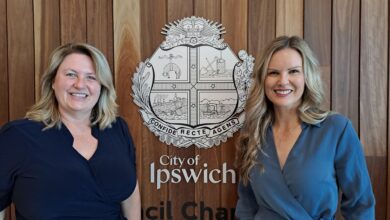Ipswich City Council will proceed with remediation work on an underground crypt containing the coffin of a member of Queensland’s first Parliament in 1860 at Ipswich General Cemetery.
Health, Security and Community Safety Committee Chairperson Cr Sheila Ireland said $20,000 would be allocated for the project to help uncover the secrets of one of the State’s first politicians, Joseph Fleming.
Details of the significant find were first revealed by council in December and investigations began to determine if it was possible to carry out the archaeological dig safely and inexpensively, and to restore the site for heritage purposes.
“There has been a high level of interest by potential partners in the project with all seeing the heritage value as a strong element holding their interest,” Cr Ireland said.
“It is the final resting place of Joseph Fleming and his wife Phoebe Fleming. Mr Fleming was a member of the first Queensland Parliament, representing West Moreton from 9 July 1860 until 3 November 1862 and subsequently from 11 September 1866 until 2 July 1867.”
Cr Ireland said council has sought support in relation to archaeology, filming, a funeral director and stonemason.
“The University of Southern Queensland Faculty of Business, Education, Law and Arts have provided in principle archaeology services support to the crypt remediation project,” she said.
“Further planning meetings have been agreed including a site inspection and preliminary investigative processes. USQ is hopeful for a July 2018 start date; however this will need to be confirmed after further planning by the university.”
USQ had also expressed an interest in the film and digital imagery aspects, including a documentary of the work and filming to support a virtual reality tour of the completed crypt.
A well-respected local stonemasonry company had agreed to be a project partner.
Cr Ireland said identification and contacting local descendants of Joseph and Phoebe Fleming was progressing well.
“Those community members who have identified with the family have been engaged with investigations revealing they were not direct line descendants. Despite not being direct line descendants the families have indicated they wish to be engaged with the project as it continues. Work continues in trying to identify local direct descendants with cemetery volunteers undertaking detailed research in the area,” she said.
Cr Ireland said the project would be delivered using six key phases:
- Excavation of the Crypt: The collapsed crypt must be uncovered using archaeological techniques to preserve the site heritage value and to identify location data for the stone blocks to assist reconstruction.
- Remove Remains: This is a sensitive phase of the project and will entail the careful removal of human remains and remains of coffins. A local funeral director and the archaeology team will be responsible for this process with remains to be held by the partner funeral director.
- Rebuilding of the Crypt: A local company has volunteered time and expertise to the rebuilding of the crypt. The lead stonemason has experience in major heritage projects including Anzac Square in Brisbane and major cathedral works in Brisbane and Rockhampton.
- Reinterment of Fleming Remains: The remains of Joseph and Phoebe Fleming in new hardwood coffins will be reinterred with appropriate ceremony and sensitivity.
- Crypt Overfill: The crypt exterior will be backfilled and turfed with a small plaque on a concrete desk placed to mark the location. The stairs and access point will be blocked with a removable barrier and filled in to present an entrance that could be made viable with small effort.
- Documentary Film: The documentary film will be finalised with post production editing and cutting and the virtual reality tour will be completed.
Cr Ireland said there would be enormous benefits to the community, including preserving a rare crypt, its funerary art and stonemason work, and to provide a virtual reality experience “for current and future generations without disturbing the deceased”.
“The interest shown by potential partners indicates a positive outcome for the project and reflects the heritage value of the endeavour,” she said.
Born in NSW in 1811, Joseph Fleming settled in Queensland in 1848. In September 1850 at Ipswich he bought town lots on which he established a boiling-down works, sawmill and flour-mill. He was also a partner in the steamer Bremer trading to Brisbane.
After his political career ended, Mr Fleming was a store-keeper in Ipswich and Roma. He died in Ipswich in 1891. He had nine children with his wife, who died in 1851.

